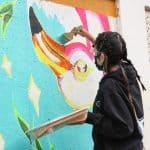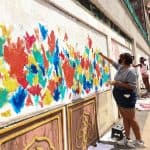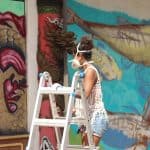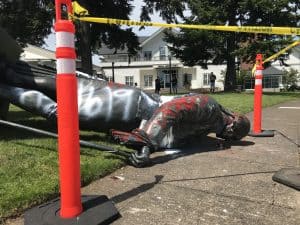Interpretation services available, email info@racc.org
Servicio de interpretación disponible | Предоставляются услуги переводчика | Có dịch vụ thông dịch | 通訳サービスあり
Application window closed Monday, Oct. 26.
Artists are essential. In times of crisis, artists express what they see and feel, helping us process what we are going through, activating, and uplifting the community.
Capturing the Moment is a new call for Black artists, Indigenous artists, and all artists of color to submit works in all media created in this moment. ANY work that captures a creative response to the COVID-19 global pandemic and Black Lives Matter movement, racial justice protests, and/or the political environment of the moment. Submissions of all media will be considered – murals, paintings, photos, films, essays, poetry, performances captured on film or video, posters, stickers, t-shirt art, etc.
This new call aims to reflect and record this time of change, uncertainty, loss, and hope. It will continue to serve and showcase some of the work emerging from artists and creatives at this moment in our history. Artist submissions selected for Capturing the Moment will be shared via RACC and the City of Portland communication channels including digital formats and social media accounts.
Supported with City of Portland #PDXCARES funding dedicated to Black artists, Indigenous artists, and all artists of color who reside in the City of Portland.

Hampton Rodriguez, Bike, 2019, newspaper on canvas, 12 x7. Recent addition to Visual Chronicle of Portland
WHAT ARE WE “CAPTURING”?
- RACC will purchase actual physical artworks/memorabilia of all media. (Framing will be provided by RACC, as appropriate.)
- RACC will also purchase written works, digital images of works, digital recordings of performances, etc. to show/use through RACC & the City of Portland’s communication channels.
Only works created since March 2020 will be considered. Selected artists will receive up to $1,500 per individual. The overall budget for this initiative is $38,000.
A panel of RACC staff and BIPOC curators selected by RACC will review and curate artist submissions. RACC reserves the right to select works from artists and creatives who do not directly apply to this call, if appropriate.
ELIGIBILITY
This opportunity serves artists who reside in the City of Portland only. Funds may only be awarded for submissions from Black artists, Indigenous artists, and artists of color who meet the eligibility criteria.
Additionally, priority will be given to artists who have not received RACC Support Beam 2020 commissions or a 2020 Project Grant or are not already well represented in Portland’s Portable Works Public Art Collection.

Elijah Hasan, See It Through, 2019, Inkjet print, 11×14. Recent addition to Portland Visual Chronicle.
SUBMISSION GUIDELINES
All artwork for consideration must be submitted through RACC’s Opportunity Portal: racc.org/apply.
Artists must create an account, or log into their existing account. Instructions in the opportunity portal will guide you through the process. Incomplete submission forms cannot be considered.
Once you have started your Capturing the Moment submission form, you can save after each step and sign out. Your proposal will be saved as a draft you can continue to work on as needed. Complete all the tasks and hit “Submit.” Please do not hesitate to contact us if you have any questions during the process.
Artists must include the following in their proposal:
- Up to eight (8) works that “Capture the Moment,” including images, writing, or video. File size should be no larger than 5 megabytes. The .jpg format, PDF format, or links to video work online is preferred. Provide no more than two (2) images per artwork/item. For each submission, provide title, media, dimensions/length, date produced, and (if applicable) background or conceptual information.
- Artist bio: A short paragraph that briefly describes your artistic practice (150-200 words).
- Applicant demographics
- Applicant W-9 form
QUESTIONS? Contact hnkent@racc.org
We’re Here to Help! Talk with the Program Staff. Ask questions and seek help early; last minute help can be in short supply.
If you have questions about the RACC application portal or if using the application portal presents a barrier to applying, contact Ingrid Carlson: icarlson@racc.org.
Application closes 5 p.m. Monday, Oct. 26, 2020.
Use RACC’s Opportunity Portal to apply racc.org/apply









